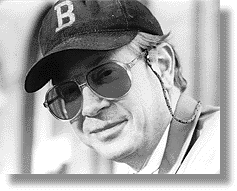
Joseph J. Ellis
Ford Foundation Professor of History at Mount Holyoke College
"I believe I am an honorable man."

Joseph J. Ellis
Ford Foundation Professor of History at Mount Holyoke College
"I believe I am an honorable man."
One unusual suggestion found in a book on how to write a novel intrigued me: the budding writer is to take a book off the shelf, strip away the dust cover and replace it with a dust cover of her or his own making--complete with title, author's name and new cover design. Voila, a book sitting there to lure the writer on to greatness.
Self-enhancement is not limited to the novice writer using this technique. It is part of human life. Many puff up their credentials or experience, exaggerating in order to impress, or not to appear inadequate. Makeup, having a body shaped by the plastic surgeon, and being 'expansive' on one's resume are common ways people present a more favorable image to the world.
Still, we do draw lines on self-enhancement. Dr. Joseph Ellis--honored
professor at Mount Holyoke (including chairmanship of the history department,
Dean of the Faculty and the college's interim president), author of a widely
acclaimed 1997 biography of Jefferson and recipient of a Pulitzer Prize
for his latest bestseller, Founding Brothers: The Revolutionary Generation--crossed
that line.
Dr. Ellis fabricated a war experience in Vietnam. He then made his
imaginary 'war experiences' an integral and extensive part of the courses
he taught. Of course, such personal involvement, even though imaginary,
gave authority and poignancy to his anti-war views.
It turns out that Dr. Ellis spent his three years in the Army teaching history at the US Military Academy at West Point, not in Vietnam. We now know that he also exaggerated the extent of his involvement in both the anti-war and civil rights movements, and he did not make, as a running back and as he claimed, the winning touchdown in the last game of his high school days.
''He has all the right credentials," one colleague lamented, "There was no need for him to fabricate any of this." Yet, lie he did. Caught, he said, "I believe I am an honorable man."
No, I do not believe so. We should be able to expect honesty and integrity from our professionals who claim to be seekers after truth and integrity. We should question whether, having been caught fabricating the truth in more than one area, Dr. Ellis has done it in other areas of his scholarly work. We should assume that Dr. Ellis learned from his parents the same lesson we learned from our own. Caught telling a fib, there was that message, "If you lie to me, how will I ever know you are telling the truth?"
We should expect that a person who wrote the truly stunning story
of those founders who mutually pledged to each other "our lives, our fortunes,
and our sacred honor" would have learned something about courage and integrity.
And honor.